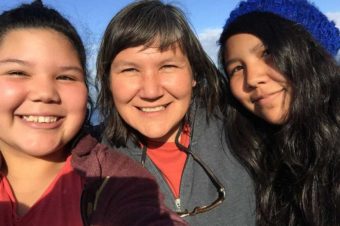
More and more Alaska Natives are choosing to use their Native language names on social media, at work and in their everyday lives. It’s a cultural shift from previous generations in which many avoided speaking their language, let alone self-identifying with it.
Department of Health and Social Services Commissioner Valerie Nurr’araaluk Davidson, however, has been using her Yup’ik name professionally for about 20 years. In this first installment of a five-part series on Alaska Native names, Davidson talks about the importance of her name as it relates to her role in Alaska’s state government.
Listen to Davidson or read transcribed excerpts from her interview below.
Valerie Nurr’araaluk Davidson
I’ve always used my Yup’ik name. I didn’t actually know I had an English name until I started school and when I did I thought I was in big trouble. For me and for Yup’ik people, our Yup’ik names tell who we are related to and where we’re from.
I’ve used my Yup’ik name on my business cards for years, for probably about 20 years. One of the reasons I do that — not only on my business cards but also when I introduce myself — is because I think it’s really important for people to know that Alaska Natives are still here, we are relevant and we do our part to contribute positively to our state and I think that’s especially important for our children to hear.
One of the things that has been a really nice surprise is when I send emails from my work email address I always say at the end “Quyana” and I’ve been really pleased how many people have started using that. For example, when the governor emails me back he almost always says, “Quyana, Val.”
I’ve had people ask me when I’ve said “Quyana” to them, “What’s the appropriate word for ‘You’re welcome’?” Which is “aa-ang” and people have started using that. So it’s really been nice to be able to incorporate that into our everyday work and how we’re starting to indigenize a little bit state government. In a small way, but that’s how big things start — one step at a time.
The meaning of names: Indigenizing government, part 1
The meaning of names: A family history, part 2
The meaning of names: A time for change, part 3
The meaning of names: The aftermath of generational trauma, part 4
The meaning of names: The world of social media, part 5
